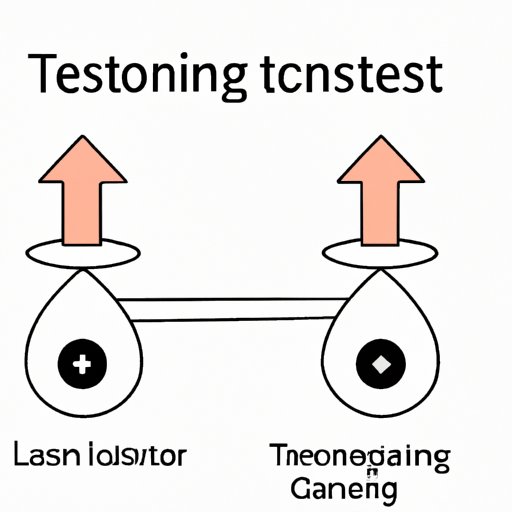
I. Introduction
Weight gain is a common concern for many people. While there are many factors that can contribute to weight gain, testosterone is often cited as one of them. In this article, we will explore the relationship between testosterone and weight gain and provide a comprehensive guide to understanding the facts and myths associated with this topic.
A. Explanation of the Problem
Many people view testosterone as a hormone that only impacts male characteristics such as muscle mass, sex drive, and facial hair growth. However, testosterone levels can also impact weight gain in both men and women.
B. Importance of the Topic
As the obesity epidemic continues to grow, it is essential to understand the factors that contribute to weight gain. Testosterone is one of those factors, and understanding how it impacts weight gain can help individuals take proactive steps towards achieving and maintaining a healthy weight.
C. Brief Overview of the Article
In this article, we will explore the myths and facts surrounding testosterone and weight gain. We will discuss the scientific realities of testosterone, how it impacts weight gain in both men and women, and the role of testosterone therapy in weight gain. We will also explore the connection between testosterone and muscle mass, the impact of testosterone on belly fat, and strategies for maintaining healthy testosterone levels.
II. The Science Behind Testosterone and Weight Gain: Myths and Facts
Before we dive into the relationship between testosterone and weight gain, it is important to debunk some common myths surrounding this topic.
A. Common Misconceptions About Testosterone and Weight Gain
One common misconception is that low testosterone levels are the sole cause of weight gain in men. While low testosterone levels can contribute to weight gain, there are many other factors that can impact weight, including diet and exercise habits, genetics, and overall health.
Another myth is that high testosterone levels automatically lead to increased muscle mass and decreased body fat. While testosterone can impact muscle mass, it is not the only factor that contributes to muscle growth. Additionally, high testosterone levels do not guarantee decreased body fat levels.
B. Scientific Realities About Testosterone and its Relationship to Weight Gain
Testosterone is a hormone produced primarily in the testicles in men and the ovaries in women. This hormone plays a role in promoting the growth and development of male characteristics, and it also impacts weight gain in both men and women.
A lack of testosterone can lead to decreased muscle mass and an increase in fat mass, which can contribute to weight gain. Conversely, higher levels of testosterone can help individuals maintain muscle mass and regulate fat mass, leading to an overall decrease in body fat percentage.
However, the relationship between testosterone and weight gain is not as simple as high levels leading to increased muscle mass and low levels leading to weight gain. Instead, it is a complex interplay between hormones, genetics, lifestyle factors, and overall health.

III. Testosterone Levels and Weight Gain: Understanding the Link
A. Explanation of the Relationship Between Testosterone and Weight Gain in Men
In men, testosterone levels and weight gain are closely linked. Low levels of testosterone can lead to decreased muscle mass and increased body fat, which can contribute to weight gain. Conversely, higher levels of testosterone can lead to increased muscle mass and a decrease in body fat percentage.
As men age, their testosterone levels naturally decrease, which can contribute to a slower metabolism and lead to weight gain. Additionally, lifestyle factors such as a poor diet and sedentary lifestyle can further exacerbate the impact of low testosterone levels on weight gain.
B. Factors that Impact Testosterone Levels and Weight Gain
There are several factors that can impact testosterone levels and weight gain in men, including:
- Diet
- Exercise
- Stress levels
- Sleep quality
- Vitamin D levels
- Overall health
C. How Testosterone Impacts Weight Gain in Women
In women, testosterone plays a less significant role in weight gain. However, women who have low levels of testosterone may experience an increase in body fat and a decrease in lean muscle mass, leading to weight gain.
Polycystic ovary syndrome (PCOS) is a condition where women may experience an increase in testosterone levels, leading to an increase in body fat and weight gain. Women with PCOS may also experience other symptoms such as irregular periods, acne, and facial hair growth.
IV. Testosterone Therapy and Weight Gain: What You Need to Know
A. Explanation of Testosterone Therapy
Testosterone therapy involves the use of synthetic testosterone to supplement the body’s natural production of testosterone. This therapy is often used to treat conditions such as low testosterone levels, erectile dysfunction, and decreased libido.
B. Potential Benefits and Risks Associated with Testosterone Therapy
There are several potential benefits of testosterone therapy, including:
- Increased sex drive
- Improved mood
- Increased muscle mass
- Decreased body fat percentage
However, testosterone therapy also comes with potential risks, including:
- Acne
- Breast enlargement
- Decreased testicle size
- Increased risk of blood clots
- Increased risk of prostate cancer
C. How Testosterone Therapy Can Impact Weight Gain
Testosterone therapy can impact weight gain by increasing muscle mass and decreasing body fat percentage. However, the impact of testosterone therapy on weight gain varies based on the individual and their overall health, lifestyle factors, and current testosterone levels.
V. The Role of Testosterone in Muscle Mass and Weight Control
A. Explanation of How Testosterone Impacts Muscle Mass and Weight Control
Testosterone plays a crucial role in the development and maintenance of muscle mass. As testosterone levels decrease, muscle mass may also decrease, leading to weight gain. Conversely, higher levels of testosterone can help individuals maintain muscle mass and regulate fat mass, leading to an overall decrease in body fat percentage.
B. Strategies for Maintaining Healthy Testosterone Levels
There are several strategies individuals can use to maintain healthy testosterone levels, including:
- Eating a balanced diet rich in protein, healthy fats, and whole grains
- Exercising regularly
- Getting adequate sleep
- Reducing stress levels
- Taking vitamin D supplements
VI. Testosterone and Belly Fat: The Connection You Need to Know About
A. Explanation of How Testosterone Impacts Belly Fat
Testosterone impacts belly fat by regulating fat storage and distribution in the body. Lower levels of testosterone can lead to increased fat storage in the belly area, while higher levels of testosterone can help regulate fat distribution, leading to a decrease in belly fat.
B. Strategies for Reducing Belly Fat
There are several strategies individuals can use to reduce belly fat, including:
- Eating a balanced diet that is low in processed foods and sugar
- Engaging in regular cardiovascular exercise
- Incorporating strength training exercises that target the abdominal muscles
- Reducing stress levels
VII. Testosterone and Women: Can it Cause Weight Gain and How to Prevent it
A. Explanation of How Testosterone Impacts Weight Gain in Women
Testosterone can impact weight gain in women by causing a decrease in lean muscle mass and an increase in body fat. Additionally, conditions like PCOS can lead to an increase in testosterone levels, resulting in weight gain and other symptoms.
B. Strategies for Maintaining Healthy Testosterone Levels in Women
Women can maintain healthy testosterone levels by eating a balanced diet, exercising regularly, reducing stress levels, and getting adequate sleep. Women with PCOS may need to work with a healthcare provider to regulate their testosterone levels and manage symptoms.
VIII. Testosterone and Weight Gain: A Comprehensive Guide for Men and Women
A. Key Takeaways from the Article
In this article, we explored the myths and facts surrounding testosterone and weight gain. We discussed the scientific realities of testosterone, the link between testosterone levels and weight gain in men and women, the impact of testosterone therapy on weight gain, and strategies for maintaining healthy testosterone levels.
B. Final Thoughts
While testosterone levels can impact weight gain, it is important to remember that weight gain is a complex issue that is impacted by many factors. By focusing on maintaining a healthy lifestyle, individuals can take proactive steps towards achieving and maintaining a healthy weight.
IX. Conclusion
A. Recap of Article
In this article, we explored the relationship between testosterone and weight gain in men and women. We debunked common myths surrounding this topic, discussed the scientific realities of testosterone and its impact on weight gain, and provided strategies for maintaining healthy testosterone levels.
B. Call to Action
If you are concerned about testosterone levels and weight gain, we encourage you to speak with a healthcare provider. They can help you assess your overall health and recommend strategies for achieving and maintaining a healthy weight.
C. Encouragement to Seek Medical Advice
This article is intended for informational purposes only and should not be used as a substitute for medical advice. If you have concerns about your testosterone levels or weight gain, please speak with a healthcare provider.




